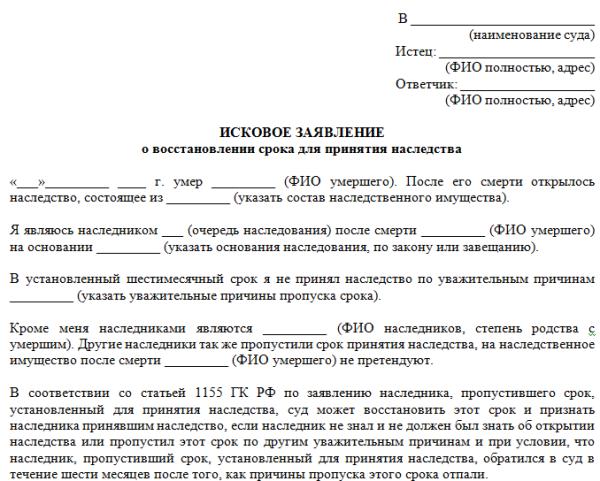The limitation period is represented by a certain period during which the plaintiff can defend his rights or interests in court. If this period ends, then the opportunity to challenge various decisions through the court is lost. But the law provides for the possibility of restoring the missed period, if the plaintiff has good reason for this. To do this, a corresponding petition containing a request for the restoration of the term must be submitted to the court.
The concept and duration of the limitation period
The limitation period is represented by a certain time period. The duration of this period may vary significantly for different categories of cases. General or special terms vary.
The total limitation period is 3 years. It is provided for by the provisions of Art. 196 of the Civil Code of the Russian Federation. Special periods can vary from 3 months to 20 years.

If the law does not establish a special period, then the general applies. When a transaction is required to be declared null and void, the limitation period is also set for three years.
Consequences of Recovery
The restoration of a missed deadline is possible only with good reason. To do this, file a statement of claim with other supporting documents, which are carefully examined by the court. If a positive decision is made, then it is allowed to file a lawsuit against the defendant, despite the expiration of the limitation period.
Reinstatement of a missed deadline may be requested already during the trial, if the defendant refers to this category of law. Based on Art. 112 Code of Civil Procedure of the Russian Federation, the claim period is restored only if there are good proven reasons. Skipping the deadline leads to the refusal to accept the claim, so the citizen will not be able to count on the protection of his interests in court.
Grounds for appeal
It is advisable to file a petition for the restoration of the missed statute of limitations with the court only if there is evidence that such a delay on the part of the plaintiff is connected with good reason. The following grounds are considered weighty:
- the plaintiff was forced to be treated in a hospital as he had serious health problems;
- the citizen was helpless, because he was under the influence of drugs, hypnosis or alcohol intoxication, therefore he could not engage in legal proceedings;
- the pass is connected with family circumstances, for example, a citizen had to take care of sick children, or he faced the death of a loved one;
- the applicant does not speak Russian well;
- a citizen lived in another region of the country;
- the man was forced to move to another city;
- the plaintiff was in prison;
- a man was called up for military service;
- the citizen was sent on a long and important business trip.
It is imperative to prove good reason. Only in this case will a determination be made to restore the missed limitation period.

What reasons are not valid?
Often, when drawing up a petition for the restoration of a missed term, citizens indicate reasons that are not valid. Under such conditions, the court does not satisfy the plaintiff. The following reasons are not valid:
- being on vacation in another country or region;
- change of the head of the company where the citizen works;
- the absence in the state of the enterprise where the applicant is working of a professional lawyer;
- the need to coordinate the application with higher authorities or persons;
- other personal problems of citizens applying to the court with a complaint.
Each situation is considered by the court individually. If the decision is made negative, then it can be appealed.
How to prove a good reason?
The application for the restoration of the missed deadline should be submitted in conjunction with other documents confirming the existence of valid reasons for missing. Only on the basis of these data the court makes a decision. Such evidence may be presented by the following documents:
- certificates from medical institutions confirming that a citizen was really forced to treat a serious or chronic illness;
- medical certificates indicating the presence of diseases in close relatives of the plaintiff;
- a police certificate containing information on the occurrence of various emergencies or force majeure, for example, an attack on an applicant with intruders, a fire in a house, a collision with natural disasters, or forcible restraint of a person;
- testimonies of witnesses in writing, and they are used only if, using other documents, it is not possible to prove the existence of valid reasons;
- other evidence that may affect the judgment.
The more documents are collected, the more chances are that the court decision will be positive, and the application for the restoration of the missed limitation period will be satisfied.
When investigating an administrative case, the missed period may be restored if the reasons specified in Art. 112 Code of Civil Procedure of the Russian Federation, Art. 117 APC of the Russian Federation, will be recognized as valid.

When to file an application?
The legislation does not establish the exact deadlines for filing a request for the restoration of a missed deadline for courts of general jurisdiction. If the citizen appeals to the cassation or supervisory authorities, then this period is limited to one year from the day when the court decision comes into force.
In arbitration proceedings, an application can be submitted no later than 6 months after the court makes a decision.
Application Rules
A petition for the restoration of the missed limitation period is presented by a document in which the plaintiff explains the main reasons for the late filing of the claim. The document includes information:
- name of the court to which the application is submitted;
- date and place of application;
- information about the plaintiff submitted by his name, place of residence, data from the passport and contact information;
- information about the defendant;
- a description of the essence of a particular case;
- the reasons for missing the deadline when it was necessary to file a claim are given;
- The documents attached to the application are listed;
- at the end, an immediate request is made to restore the missed deadline.
When compiling this document, it is recommended to focus on the provisions of Art. 131 and Art. 132 Code of Civil Procedure of the Russian Federation. The application is accompanied by the available documents, which serve as evidence of the plaintiff’s good reason. If there are no errors in the application, then it will certainly be considered by the court, which allows the restoration of the missed deadline. A sample of such a statement can be studied below.

When is a document not accepted?
The main reasons why the court does not accept the application are listed in Art. 134 Code of Civil Procedure of the Russian Federation. These include the following grounds:
- the applicant chose the wrong court;
- there are errors in the documentation, and they may relate to its content or design;
- a court decision has already been issued in this case;
- the person filing the application is declared legally incompetent;
- the document is endorsed by a person who does not have the relevant rights.
If the court leaves the application without movement, then the notification is transmitted to the plaintiff within 5 days from the date of transfer of the application to the court.
Application Procedure
In order to restore a missed deadline, an application can be submitted to the court in various ways:
- personal transfer of a document;
- sending an application by mail;
- through a representative having a notarized power of attorney.
The best option is to transfer the document in person to the court registry.

The nuances of the application
The court shall restore the missed time period simultaneously with the consideration of the main claim in this case. An application may be submitted at any stage of the trial. The main features of this process:
- the court may decide on the application without the participation of the parties to the proceedings;
- the judge issues a court order, of which the participants in the proceedings are notified;
- the petition can be made in free form, which takes into account the rules for the formation of claims and business letters;
- the application is considered within 5 days.
The procedure is individual, depending on the circumstances of each case. Entrepreneurs and companies cannot rely on a deadline even if there is a good reason. The law provides for such exemptions exclusively for private individuals. Most often, the restoration of a missed term by inheritance is required.

Can a defendant raise an objection?
The defendant has the right to file motions to the court on a par with the plaintiff. These statements may relate to different issues, therefore, a complaint is often made to restore the missed deadline by the plaintiff. It is called an objection, and the features of its application include:
- objections may be filed with the district court or magistrate;
- they can be submitted not only in writing, but also orally directly at the hearing;
- in an objection, the citizen makes comments and gives a response to the application for the restoration of the term.
When drafting such a document, the defendant usually focuses on the fact that the petition drawn up by the plaintiff does not comply with the law or is inappropriate and contains false information.
The objection is filed in free form. According to the Code of Civil Procedure of the Russian Federation, the details of the court and participants in the trial must be included in it. The applicant must ensure that all information in the document is concise, simple and understandable.
The deadline for filing a complaint to restore a missed deadline is not regulated by law, so this process can be carried out at any time after the plaintiff submits an application to the court.

Statute of limitations for companies
For companies, there are certain differences in regulations on the limitation period. The significant difference is that firms do not have the right to rely on the restoration of a missed deadline. Moreover, even in a situation where they had significant reasons for missing.
Such restrictions are due to the fact that the head of any company has the opportunity to use a power of attorney to send any employee of the company to court. Therefore, such reasons as illness, absence in the city or other reasons cannot be applied to legal entities. According to the law, it is impossible to restore the missed limitation period.
Conclusion
Skipping the statute of limitations may occur for various reasons. If a citizen has good reasons, he can file a petition with the court to restore this period.
The defendant in court may file a complaint for the restoration of the term. When forming any document, it is important to take into account the requirements for claims and business letters of art. 131 and Art. 132 Code of Civil Procedure of the Russian Federation. Companies cannot rely on a limitation period.
